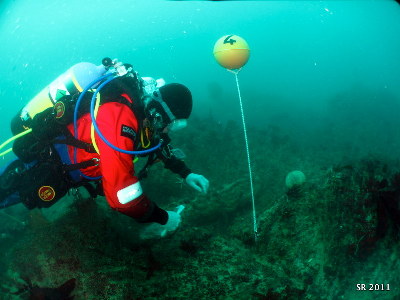In the 50th year of the Protection of Wrecks Act 1973 a new survey by the Protected Wreck Association reveals the huge contribution volunteer divers make to the marine historic environment.
- 2023 is the 50th anniversary of the Protection of Wrecks Act 1973 and represents fifty years of divers acting as voluntary custodians on nationally and internationally significant wreck sites
- A new survey undertaken by the Association reveals in 2022 alone divers volunteered over 1,312 days working on protected wreck sites
- Volunteers contributed nearly £80,000 in 2022 to support the management of protected wreck sites
- The average volunteer is now over the age of 66 and new divers are urgently needed
Fifty years ago this year, a small piece of legislation was enacted that established, for the first time, the opportunity for Government to protect important historic shipwreck sites. There are currently 64 protected wreck sites across the UK designated under the Protection of Wrecks Act 1973, which is administered by DCMS and the Heritage Agencies. The Protection of Wreck Act 1973 enables the Secretary of State to designate a restricted area around a wreck to prevent uncontrolled interference. Shipwrecks can be designated under Section 1 of the Act on account of their historical, archaeological or artistic importance. The Act was introduced to address issues with the exploration and investigation of historic shipwrecks in the early 1970s that were damaging marine heritage and causing public outcry.
Licensing by the Heritage Agencies utilises volunteer divers as effective voluntary site custodians providing the eyes on the seabed to monitor, research and protect the wrecks. Some divers have been investigating sites over many decades; some 46% have been involved with the sites for fifteen years or more. The skills needed for investigating and caring for an important historic wreck site are broad and volunteers acquire a high level of responsibility, as they are ultimately responsible to DCMS. The volunteers work tirelessly on the protected sites, mainly funding their investigations themselves, to help bring these wrecks alive for the public on dry land for everybody’s benefit. They are a unique breed of diver: focused, enthusiastic, committed and dedicated.
The role of the volunteer Licensee has played an essential vital part in the ongoing management of sites designated under the Act. In recent years there have been over 200 Licensees and team members active on England’s Protected Wreck sites, with more working elsewhere in the UK.
The Protected Wreck Association have undertaken a survey of its members to try and find out more about their volunteering. The survey has revealed that in 2022 alone, divers volunteered over 1,312 days to diving on, researching and engaging the public with protected wreck sites.
During their volunteering, they personally contributed nearly £80,000 to the management of protected wreck sites; this includes paying for boat time and fuel, purchase of survey equipment and travel to archives for research. 23% of survey participants are seeing a negative impact on their volunteering due to the cost-of-living crisis, with a further 40% anticipating it will have an impact in the near future.
The survey provides a snapshot of the value of the contribution of volunteers in just one year. It should be highlighted that the survey respondents represent only a small number of those who volunteer their time in such a way and the true figure is likely to be much higher. It can therefore be concluded that the value of 50 years of volunteering is highly significant and has helped underpin management of the UK’s most important maritime heritage throughout that time.
The survey also revealed that almost half current diving volunteers have been involved with the sites for over fifteen years. The average age of a volunteer diver is over 66 and it is recognised that more divers are now needed to get involved with these nationally significant sites to help aid their management into the future.
The work of Protected Wreck Association members helps reduce the number of historic wreck sites that are at risk and help heritage agencies, including Historic England and Cadw, in the management of these sites that are protected under the Protection of Wrecks Act 1973 or scheduled under the Ancient Monuments and Archaeological Areas Act 1979.
Professor Mike Williams, Chair of the Protected Wreck Association said: “Licensed diving teams are the unsung heroes of the UK’s underwater cultural heritage. Without fanfare, year after year, they go out investigating, recording and safeguarding the public’s maritime heritage. They are the embodiment of the adage ‘Take what you need, give more than you take”.
In England, Historic England recognise the huge contribution made by volunteer licensed divers in helping them to manage nationally significant wreck sites, such as the London that exploded and sank in the Thames estuary in 1665 and the Bronze Age and 17th Century sites in Salcombe, by classing them as affiliated volunteers.
Hefin Meara, Marine Archaeologist at Historic England said: “The efforts of the protected wreck licensees are invaluable for the investigation and monitoring of these nationally important shipwreck sites. The results of the survey emphasise the significant contribution made by avocational divers to the care of our underwater cultural heritage. We look forward to continue our collaboration with the Protected Wreck Association, in order to support the vital projects undertaken by the Licensees”.
Read the full survey report here.

